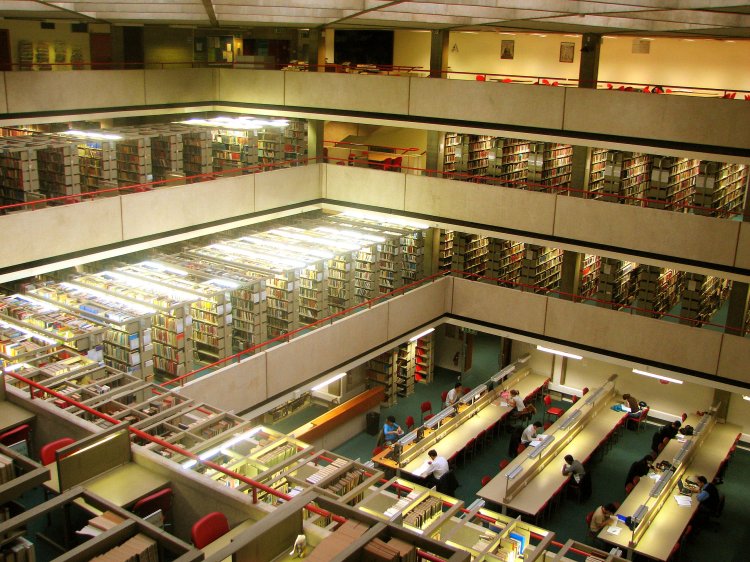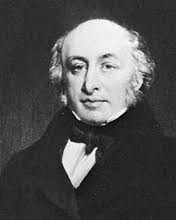Why are we here? I’m not going to attempt to answer the big theological debate here, at least not today. Everyone goes through a series of events or experiences that gradually shape their ideas, ideals and general outlook on life. Being born in the late 20thC is a big factor, it is a fact that blogging only really took off after the discovery of electricity. Being blessed to read and write English is pretty much taken for granted on this page but for those who can’t, I do always try to include some interesting photos.
To really narrow it down as to why I am here perhaps my shiny new Vic 20 computer in 1980 should take a lot of credit as should my parents for not only being far-sighted enough for buying it for me but not neglecting the traditional hobbies of reading and writing. Earlier this week I watched a television documentary and though it was featured for only a few minutes, I instantly knew that the SOAS library is what set me on the course that led me here.

The SOAS library (London School of Oriental and African Studies) has been described as one of the most amazing places on Earth and it is where I spent 4 mostly very happy years. It houses 1.5million books in over 400 languages along with thousands of precious manuscripts and documents specialising on the most niche subjects in the non-Western world and is probably the worlds leading centre for African, Asian and Middle-Eastern studies.
The knowledge contained therein is staggering and it sometimes seems as if it is alive with its own complicated consciousness. Mirrored round the academic year September and October would be buzzing with students trying to familiarise themselves with the workings of the place and locating key publications which would generally be down to luck, determination or good fortune. Some books just never moved except when I checked their inside cover to see that they were last checked out decades ago whilst others were so vital to courses that 30 minutes or an hour was all one was permitted with a book. Quick reading and note taking coupled with lots of credits on your library photocopier card were vital. The library would also buzz just before Christmas even though students who celebrated Christmas were obviously in a minority. There would then be the final curtain call in the early summer exam revision period. Good memories, not.
I often thought one could spend their entire life in that library and indeed many people did their best although it was always quiet early on a Monday morning, fridays or during the heavenly summer holiday which was very nearly endless.

The library was centered around the magnificent main reading room which defies descripton and oozes academia overlooked as it is by both high walls full of books and several upper library floors. Whether sat reading in the room itself or looking down on it from above the awe inspiring feeling is much the same.
The library itself is categorised by both region and discipline with each one having its own reading room and isolated seating areas. What a pleasure it was to walk down the aisles and look at the books, sometimes pulling one out and finding a new insight on the world. It could be a dangerous game though at least on my history and politics courses there was more than enough reading to be had especially for essays and the tutorial presentations one had to be ready to speak on to the class. How many times did I go into the library looking for books on the Ottomans and come out with Iranian Safavids or go in for African development and come back with yet another Central Asian book. I am frankly amazed that I got through several months of basic politics from Plato and Aristotle through to Mills and Rousseau when I foolishly went up to the Southern African history zone and got diverted for the rest of my life by books, diaries and critiques of the Anglo-Zulu wars which were much quieter than my regular Middle-East stomping ground though not as quiet as the Chinese and East-Asian areas though 15 years later maybe this isn’t as true as it was.
Of course the books were just a part of the equation, the other important section being the people. Bags and coats not being allowed in the library queuing to drop off your belongings was a fact of life. In quiet periods it was no problem but low and betide anyone who wanted to drop off their gear on a wet January lunch time. You could be there for a long time once all the spaces were taken and friends could be made for life in that queue. It could also be a good place to catch up with people who you only met in the queue and if you were lucky you could look after each persons bag while the other went in the library to take care of business.
The students at SOAS were and are amazing. I remember by the end of the first term that I went through in my head every country I think of and I was happy to say I knew someone from everywhere and had friends from most of them. Americans to Zulus, Afghans to Zimbabweans and everywhere in between you’ve heard of or not. And what a place for debate and discussion on everything, the pleasure of hearing conversations slide from one language to another and then another two after that. One time I remember someone called on the front door of my parents house and they asked who it was and I just said it was some white English man. Not very helpful to them but to me he was very unique and memorable.

The library also saw its fair share of protests and sit-ins on tuition fees, university policy, politics and wars. One time I distinctly remember seeing a sheep on the second floor. I liked that about SOAS, it is a place where ideas and events weren’t just studied but lived out and built upon. Everyone there had a story and as their were sons and daughters from countries near and far there were always rumours and stories of spies and espionage. Some were children of the elite of their countries and others were those trying to overthrow these same elite.

All this aside the real reason I am here is because I love writing. I wrote one book based on what I learnt at SOAS and some of the trips it inspired me to make but the reason that I started writing at all wasn’t just because one day I got stuck with an essay and thought it would be so much easier to write a TV manuscript though it was. The reason I started writing is because of a book entitled Hajji Baba of Isfahan by James Morier. James was a British council posted to the Ghajar Court in Persia in the mid 19th Century today the place is known as Iran. Like many westerners he became entranced by the different customs and life-styles in the exotic orient and at the time there was a growing thirst for knowledge in Europe about this great old land long before its’ current Islamic government.

Arabs and Iranians don’t agree on everything but they share a love of literature and story telling and travelling. Professional story tellers would visit villages and dramatically recount stories and histories sometimes helped by props and paintings. Indeed a famous example in Central Asia would have the story teller reciting the tale for 6 months non-stop although these days it is abbreviated to just a few days. Some of the greatest and fantastical literature in everyway is that of travellers. Perhaps the most famous being that of Ibn Battutah who went from Morocco just below Spain all the way to China and who became an outlaw, judge, ambassador, holy man and everything imaginable on his 75,000 mile trip. All on a diversion from his planned pilgrimage. A modern tribute and journey in his footsteps is the very readable Travels with a Tangerine by Tim Makintosh- Smith. He tells of tales that may sound unbelievable and many may not have happened but the enthusiasm by which they are told makes everything seem possible as any modern day traveller to somewhere like Egypt can testify.
Knowing this as well as I do James Morier wrote a life-long epic in a rags to riches style of Hajji Baba of Isfahan based on the things he knew of local society and some stereotypical assumptions which he thought might go down well with his readers. Told in the manner of a local story teller, The Adventures of Hajji Baba instantly became a big success although once translated into Farsi (Persian/Iranian) it so insulted many of the Iranians that James Morier lost many of his friends.

I didn’t read Hajji Baba myself at university but a friend found it in the SOAS library no doubt after being diverted himself and he gave me a quick rundown as to what it was about. Like the hundreds of pages of notes I made whilst studying which I thought might be usable in a good book one day, I filed away the name Hajji Baba until my postgraduate year after finding a copy in the SOAS library and almost immediately purchasing a 100 year old copy for myself it became the inspiration for my first novel which in turn enticed me to travel and so write my second.
I can’t help but wonder what Hajji Baba would make of the wonders of SOAS library with all the different peoples there. He most likely would have spun an amazing yarn and got into all sorts of scrapes but would he have come across a sheep whilst looking up a history book during a library sit-in, probably not, perhaps Ibn Battutah himself would declare the SOAS library the most amazing place in the world?
Wonderful – makes me realise how I misspent my childhood by never passing through that library. What a nice thing it is, though, to immediately recognise all your references, and have read the books you mention, or the biographies.
LikeLike
I feel bad that I didn’t use it enough myself and would really like to just spend a day browsing there again one weekend. That’s great that you picked up all the references. It’s like the feeling you get when you smell your favourite meal in the oven or find a really comfortable new pair of clothing.
LikeLike